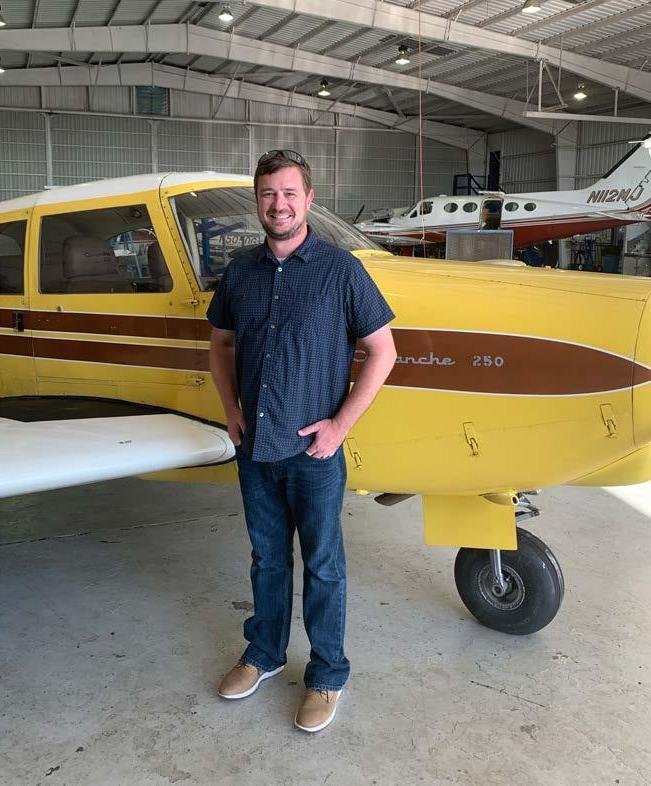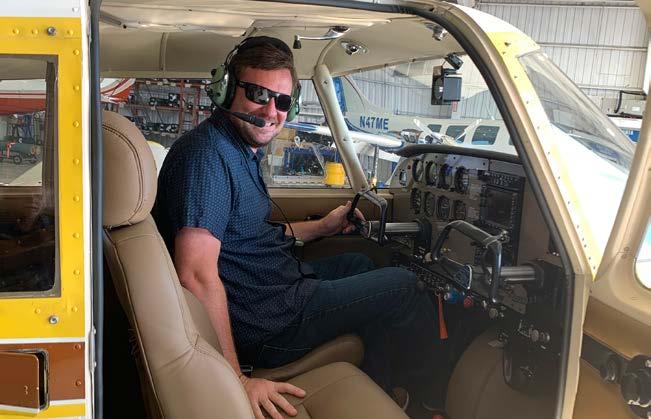
5 minute read
Dr. Aaron Judy
TAKING RESEARCH TO THE SKIES
DR. AARON JUDY’s ’18 (Ed.D.) interest in aviation began at a young age. He grew up spending time at the airport with his grandfathers who flew with the U.S. Air
Force and then flew commercially after completing their service.
“My first flight was with my grandfather at the local airport when I was seven years old. He took me out in a helicopter and then in a small Cessna 172,” said Aaron.
His current career reflects the deep impact that those years had on his life.
Aaron always knew that he wanted to pursue aviation and flying, so studying engineering at West Virginia University was a natural fit. “It sparked an interest

in me. I’ve always been more of a handson, problem-solving type of person, and engineering seemed like the right choice,” said Aaron.
He graduated with two bachelor of science degrees, one in aerospace engineering and one in mechanical engineering. When Aaron graduated with his bachelor’s in 2002, the U.S. government was actively recruiting many STEM professionals due to the 9/11 attacks. He moved to Washington, D.C., to begin a position with the U.S. Department of Defense conducting aircraft flight testing and working with unmanned aircrafts. Many of the military systems he worked on were utilized in Afghanistan and Iraq.
During this time, Aaron also went on to earn his master’s in aeronautics from Embry Riddle Aeronautical University. When a job opportunity came up at the U.S. Special Operations Command, he left D.C. to move to Tampa, Fla. As a senior engineer, he worked to help deploy unmanned aircrafts for special operations forces through research, development, training and sustainment. By providing them with the best technology and training, he ensured that the U.S. Special Forces had the right equipment to win the fight and return home safely.
After the work he did at the Special Operations Command, Aaron now works in Orlando at the Naval Air Warfare Center Training Systems Division as a lead test engineer.
There is currently a huge pilot shortage in the military and civilian market. Because of this, the U.S. Navy and U.S. Air Force are aiming to come up with new and
innovative ways to make training more effective for pilots. Formulating new ways in which pilots can be trained is a large need in the market, and Aaron recognized that.
“The question that people are asking is, ‘How can we more effectively train pilots quickly and efficiently without compromising safety? What technologies and methodologies are out there?’” said Aaron.
This is what spurred Aaron to pursue his doctoral degree in education. A large need in the aviation industry had to do with education, which is what brought him to Southeastern.
“I had never been to a faith-based institution. I chose Southeastern for the multidisciplinary doctoral program and also for the faith-based background to round out my education,” he said.
“Once I graduated from Southeastern, I wanted to continue researching the topic of my dissertation, which was looking at the effects of actual aircraft flight training versus simulation training in a U.S. Navy T-45 aircraft. Once my dissertation ended, I went back to the Navy and began my postdoctoral research. The Navy granted me the funds to spend another year looking at the data I had analyzed during my dissertation,” explained Aaron. He, alongside Dr. Thomas Gollery, professor of education, and Dr. Patty LeBlanc, former professor of education, analyzed more than 486,000 data points regarding U.S. Navy T-45 flight hours, T-45 simulation hours and student scores.
“At the heart of Dr. Judy’s research is the role of simulated flight training in preparing competent naval aviators. Determining the specific flight tasks that Navy pilots may accomplish successfully in simulation, as opposed to actual flight training exercises for flight competence, will provide the Navy with a clearer, more precise picture of the manner in which
Aaron and Christin Judy
resources should be allocated in producing the most competent aviators. Dr. Judy plans to extend his research agenda on the role of flight simulation in the time ahead with the Navy,” said Gollery.
Aaron recently published his dissertation, “A study of flight simulation time, aircraft training time, and pilot competence as measured by the naval standard score.”
When Southeastern launched its aviation program in the fall of 2018, Dr. Joe Childs, director of aviation programs, asked Aaron to sit on the advisory board for the program. He now serves as an advisor, and it is likely that Aaron will also teach an aviation course for Southeastern in the future. He is also looking to conduct more research from an Air Force perspective.
“Coming to Southeastern has opened up so many doors, and I have had a good relationship with the university. It has broadened my perspective of going to a private, smaller university and having close relationships with a lot of professors, unlike at a larger university,” said Aaron.
Aaron is currently using what he learned during the program to continue studying flight training for the military. “My day to day involves attending design reviews, reviewing flight test plans, reviewing training curriculum and participating in aircraft test events,” said Aaron. He continues to use his dissertation findings and research work to help the U.S. military discover shortfalls in flight simulation and identify ways to make simulation more meaningful in flight training.
“I love what I’m doing now, and I plan to stay with the Department of Defense, but eventually I probably would look at doing some type of educational research or teaching,” said Aaron.
CHRISTIN (MCDOWELL)’07, Aaron’s wife, is an alumna of Southeastern with an education degree. The two met in 2013 on a missions trip through Victory Church in Lakeland, Fla. Christin is currently a fourth grade English language arts teacher at Kingsford Elementary School in Mulberry, Fla. In 2018, Christin was awarded Teacher of the Year at the school.
When he is not flying planes as a pilot or completing research, you can find Aaron outdoors. “I love fishing and hunting, so that’s where you’ll usually find me,” he said. Aaron and Christin are also both very involved in their church and have taken missions trips to Nicaragua, Ecuador and the Dominican Republic. They also lead a small group in their home, and Christin helps with children’s ministry.

